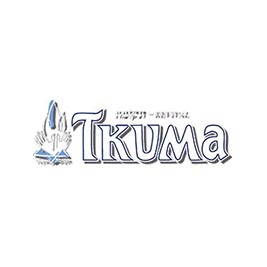Bank of Portraits / Zirchenko Mykhailo and Pavlo

Zirchenko Mykhailo and Pavlo
Pavlo Zirchenko lived with his wife and two children in the village of Blahodatne, Krynychky district, Dnipropetrovsk region. He worked as an accountant at the local collective farm.
At the end of 1942, a group of 32 Jewish refugees came to the village, mostly women and children. All of them came from the town of Ordzhonikidze (now Yenakiieve) Stalin (now Donetsk) region and were relatives and friends. The senior in the group was Matvii Hontov. He was good in peasant work because he grew up in a Jewish agricultural colony.
They left their hometown on the eve of the occupation and later settled near Rostov-on-Don (German troops occupied it a year later, in July 1942). Everyone in the group was a Jew, so they decided not to stay in one place to avoid danger, and wandered from village to village.
One of the women, Betia Peresetska, grew up in a German colony and spoke German well. This knowledge has repeatedly helped her to save the group from death. But winter was coming, and people needed a permanent shelter. Everyone was tired of the long road, there was a lack of warm clothes and food.
Eventually, they found themselves in the village of Blahodatne. Local authorities allowed them to stay, settling the families of the refugees in different houses. However, it did not solve the problem of food: there was no work on the farm in the winter, the locals were starving and had nothing to share with the newcomers.
Matvii Hontov asked an accountant Pavlo Zirchenko for help. He allowed the new settlers to take a few bags of flour from the collective farm warehouse, gave them potatoes, cabbage and beets. Thanks to him none of them starved to death in the winter.
In the spring, everyone who was able began to work with collective farmers. Pavlo informed his Jewish friends about the planned raids of the police.
With the help of his 16-year-old son, Mykhailo, a former art school student, Pavlo made several certificates with a fake stamp for Matvii and members of his group. When the Germans arrived in the village, the children were hidden on the outskirts.
"At the risk, we began to produce false documents with "stamps" of the Soviet and German types. These documents indicated nationality: Russians, Tatars, Ukrainians. My father issued certificates, and I put stamps, carefully redrawing them from German and Soviet documents. That is where the God-given gift of an artist was needed – till that time I managed to learn fine art for a while. For my "tricks" with stamps, I used all sorts of "materials at hand", for example, raw potatoes. The result was quite good." From the memoirs of Mykhailo Zirchenko.
Under Pavlo's protection, the Jews waited till the expulsion of the Nazis in October 1943.
On November 16, 2004, Pavlo and Mykhailo Zirchenko were awarded the title of Righteous Among the Nations.
There is a street (formerly Naberezhna Street) in Blahodatne village which was named in honor of the Zirchenko family.

Ukrainian Insitute for Holocaust studies
Dnipro
-
fingerprintArtefacts
-
theatersVideo
-
subjectLibrary


